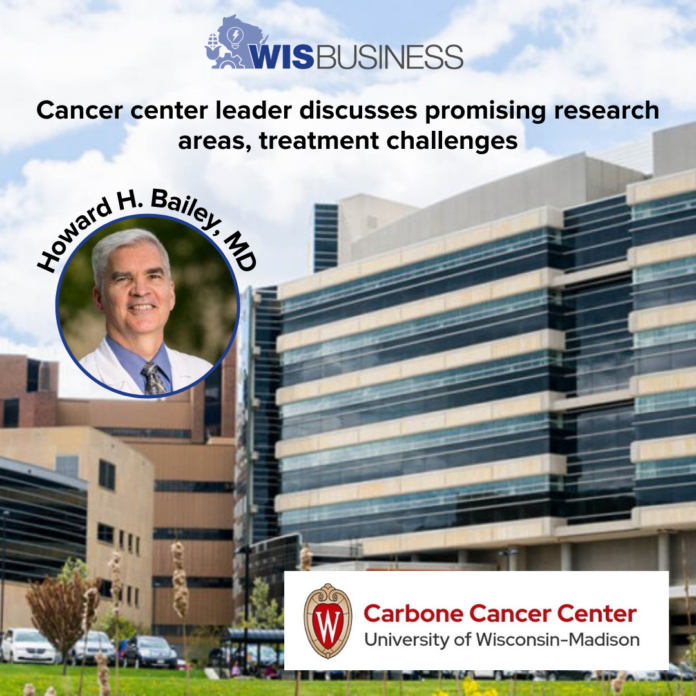The head of the UW Carbone Cancer Center says advanced imaging, nuclear medicine and immunotherapies are among the most promising areas of cancer research happening in Wisconsin.
Dr. Howard Bailey, director of the Madison-based cancer treatment and research organization, spoke this week during a meeting of the Wisconsin Technology Council’s Innovation Network. He emphasized the progress being made in understanding and developing more effective treatments for the disease, as well as new approaches to prevention.
“What has happened in the last 10 to 15 years, with the discovery of more aspects of immunology, is we are literally curing people now that 10 years ago we did not,” he said Tuesday. “So there’s great growth in that, and how we can apply that to all things.”
UW-Madison researchers at the UW Carbone Cancer Center are studying prostate cancer, multiple myeloma, breast cancer, leukemia, and head and neck cancers, among many other forms of the disease. The center is typically engaged in 20 to 30 different studies at any given time, Bailey said.
But the central challenge of developing treatments is that even within a specific type of cancer, significant variations can make it difficult to treat different patients in the same way, he explained. Two women with a specific form of breast cancer — infiltrating ductal carcinoma, for example — could have different genetic factors and require different treatments.
Still, he said combining the latest imaging techniques with the use of radioisotopes shows great promise, touting the work of nuclear chemists in the field of cancer diagnostics and therapy. These radioactive materials help clinicians identify the precise location and structure of cancer within the body, enabling the targeted destruction of these cells while healthy tissues are spared.
Meanwhile, new breakthroughs in immunology are giving patients’ own immune systems the ability to fight off cancer.
“What has happened in cancer research and care is, diseases will have kind of a sudden big jump,” he said, referring to advances in how they’re understood and treated. “But again as you’d imagine, the catch is there’s hundreds of different cancer types … In some cancers, we’re always making little baby steps. In others, it’s just suddenly a big leap.”
Along with improved treatments, Bailey also touched on his work related to preventing cancer in the first place. He said the UW Cancer Center leads such efforts that include other major institutions such as Mayo Clinic and Johns Hopkins.
“We’re doing some of the first in the world breast cancer prevention vaccines right now, where people are flying in to do some of that with us here, and in other areas,” he said. “Again, we’re not there yet, but that’s some of the things we want to look at.”
Getting innovations like these into the clinic in a timely manner often requires private enterprises, he noted. Bailey added researchers are increasingly interested in getting involved with that process.
“When I first started, oftentimes researchers just wanted to do their thing in the lab — which is wonderful — and that was it,” he said. “But nowadays, the new generation even of very basic researchers, they want to know how are you going to get my knowledge, my creativity to people … How are we changing people’s lives?”
The “vast majority” of the clinical trials at the center are conducted in partnership with pharmaceutical companies and startup businesses, he added.
“That’s the fastest way to make a difference,” he said.
–By Alex Moe






